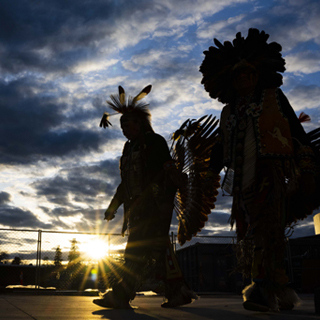Tribal Hometown Visits
Cultural Context Through Engagement
Many of UM's tribally-affiliated STEM graduate students relocate from one of the Tribal Reservations within Montana to attend the university; places that differ from Missoula in many ways, including the collective community our students might be accustomed to and thrive within.
The goal of these hometown visits is to provide an opportunity academic advisors to experience their students' cultural context, witness the importance of their education to their community, and appreciate their motivation and resilience that supports their persistence. Our hope is that tribally-affiliated students, in turn, experience more holistic understanding from their advisors as a result of these visits, creating productive, trusting, and meaningful professional relationships.
Hometown Visit Details
- Travel, lodging, and meal per diem will be covered by CIS.
- Paired advisor and tribally-affiliated advisees are encouraged to apply.
- Both advisor and advisee must be from a STEM discipline (includes disciplines in the life sciences, physical sciences, engineering, mathematics, computer science, and health sciences).
- Students/advisees must be in a graduate program.
- Hometown visits will be for the duration of approximately two days.
- Dates of travel are subject to the advisor's and advisee's availability.
- Advisor and advisees will coordinate travel and accommodations.
- Participation in the Indigenous Mentoring Program (IMP) is not required but encouraged.
Hometown Visit Application
CIS will accept up to five STEM advisor-advisee applicants per academic year. The CIS committee will review applications on approximately the first and third Thursday of each month, and will respond to applicants accordingly. This timeline is only an estimate and will depend on CIS resources.
Once all five pairings have been selected, the application will close for the academic year. Before completing the application, it is recommended that advisor-advisee pairs confirm mutual desire of involvement.
